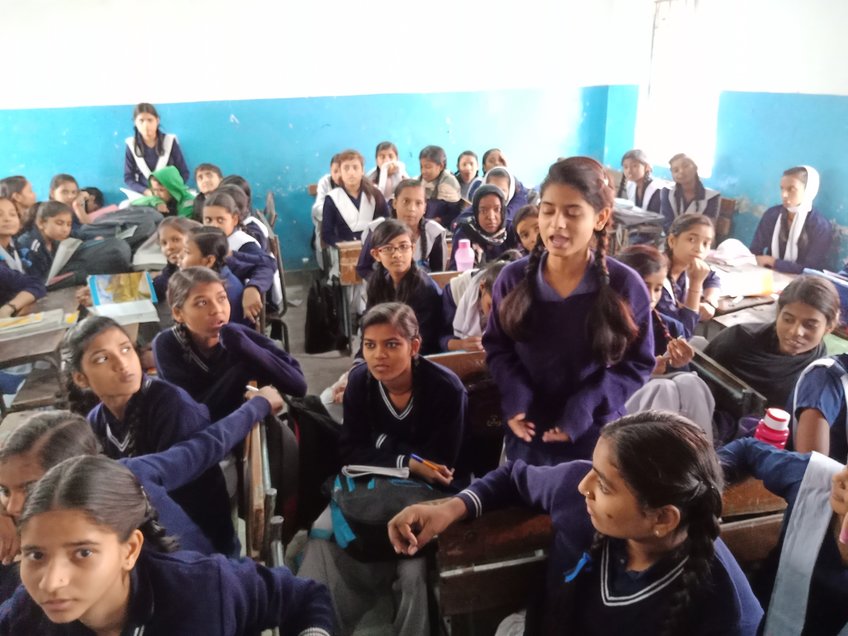Voices: What is Stressing out Delhi’s Girls?
The World Health Organisation (WHO) estimates that 10-20% of children and adolescents experience mental disorders. If untreated, these conditions severely influence children’s development, their educational attainments and their potential to live a fulfilling and productive life.
In the recent past, the debate around mental health has got some traction, with efforts being made by different stakeholders to inculcate awareness among everyone. Several organisations are leading mental health training programs for students and adolescents.
Also Read: Ask the Experts: Child and Adolescent Mental Health
In this context, The Health Collective recently visited a senior secondary government school in Sangam Vihar, New Delhi, where we spoke about mental health issues with girls from the ninth standard.

The discussions revolved around how daily incidents and life experiences of these girls trigger depression and impact their mental well-being. The age range of the class varies from 13-17 years. This is a critical time, as we know — a myriad biological changes occur during puberty including physical and emotional changes, as well as sexual maturation and changes in body composition.
For those of us who remember going through adolescence, it often feels like you’re all alone, that no one gets it.
The Health Collective asked these students, “Do you feel you have someone who listens to your problem without interrupting and without being judgmental?”
Initially hesitant, the students started opening up gradually. Though the reasons and concerns vary, a common thread is the role of gender — how it interacts with patriarchal family structures and societal processes to discriminate these girls.
Reeta, an enthusiastic and outspoken student, told The Health Collective, “I have a cousin brother who listens to me without being judgmental. Whenever I have any issue, I speak to him and I feel better.”
However, not everyone was so lucky. Vinita said, “Our friends understand us but they interrupt us always and thus, the issue goes out of hand. This is why we don’t discuss our problems.”
As Reeta and Vinita spoke, the conversation moved to problems and issues — apart from exams — which have an impact on their mental well-being.

The Health Collective asked, “Apart from exams, what are the other issues and problems which impacts your mental state and well-being”?
Komal said, “I am not able to focus on my studies because of my parents. They give more importance to my brother and only he can use Facebook and Whatsapp. Because of this, I have started hating my parents and this is a huge problem I face.”
Also Read: Dating in the Teenage Era
A girl who didn’t wish to be named told the Health Collective, “My financial problem disturbs me a lot because in my family, I have five members who are all elder brothers and sisters. Therefore, my father isn’t able to pay money for our studies and sometimes, I and my family do not have anything to eat.”
A 2012 study conducted in China found that early-life nutrition also has a profound effect on neurological development and psychological health during adult life.
The issues some students are facing, are quite simply, traumatic. Priya spoke about the sexual abuse she faced a few years earlier.
“Whenever I sit alone, a certain incident comes to my mind. I was around 10-12 years old, I was sexually abused by a boy who is our relative. My whole family knows this but they do not take any action because he is a relative. But this issue affects me now also as my grandmother told this to everyone.”
Also See: Child Abuse Helplines
More conversations revealed the impact of sexual harassment on mental health and well-being. As you can watch in the video below, Khushboo tells the Health Collective about a boy who has been calling her every day and stalking her, even threatening her with an acid attack if she rejects him*.
“Since the past 3-4 days, a boy has been calling me everyday and saying that I have been after you since two years. How can you reject me? He threatens me by saying that I will harm if you come out. I will throw acid at your face,” she tells The Health Collective. “I do not even know who the guy is and I haven’t told my parents till now.”
This 2016 report suggests that sexual objectification is both directly and indirectly linked to various mental health distresses and disorders in women, including anxiety, depression, disordered eating, and reduced experiences of flow and productivity.
There are many issues that make children and adolescents vulnerable — and a disconnect with their parents is definitely one of them.
“Disconnected with parents who are unable to fathom the complexity of this generation, kids often open up to peers/media friends in unhealthy ways that make them vulnerable and easy to exploit. Heart breaks and a deep sense of being let down, leading to anxiety and depression, is increasing alarmingly,” said Dr Amit Sen in an earlier interview to The Health Collective.
Also Read: Mental Healthcare In Educational Institutes
After our session at the school, Arpita Tiwari, a Teach For India Fellow, who teaches this class told The Health Collective that she learned about some of the multiple issues troubling these school kids. “The session started with a giggle around what could be mental health. But with the flow, kids realised that there are a lot of things troubling and they are unaware,” she says, “As a teacher, I got to know that how multiple things impact the students’ performance and I was busy judging them on the basis of their academic performance.”
Six girls agreed to speak to The Health Collective on record about their mental health and what issues trigger depression and anxiety in them. Watch a short excerpt of the video right here.
Coming Soon: More #Voices on The Health Collective
*The Health Collective communicated the disturbing revelations made by some of these students with the Teach for India Fellows in charge of the class.
Disclaimer: Devanik Saha was a Teach For India Fellow between 2011 and 2013 and worked with some of these students when they were in Class III and IV.





Pingback: Parenting in Urban India: A Quick Take
Pingback: Lessons From a Student Support Centre, One Year On